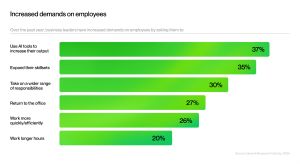Researchers: AI’s Productiveness Beneficial properties Come at a Price
A latest tutorial research discovered that as organizations undertake AI instruments, they are not simply streamlining workflows — they’re piling on new calls for. Researchers steered that “AI technostress” is driving burnout and disrupting private lives, whilst organizations hail productiveness positive factors.
The research explores AI’s twin affect on workers’ work and life well-being, discovering that whereas it could possibly improve productiveness, it could possibly additionally trigger destructive results, such because the demand to at all times do extra.
Whereas AI instruments are marketed as time-savers and productiveness boosters, the fact for a lot of employees is extra complicated. In a brand new study within the Worldwide Journal of Data Administration” printed at ScienceDirect, researchers discovered that AI typically introduces new pressures relatively than assuaging them. “Technostress related to AI is prone to manifest as calls for and urgency on workers, affecting their work and life,” the authors wrote, pointing to phenomena like cognitive overload, blurred boundaries, and elevated tempo. These findings counsel that, removed from relieving workers, AI could also be fueling a quiet expectation to do extra with much less.
As does a lot different latest analysis, the research explores the double-edged sword of enterprise AI, which gives each advantages and challenges, by analyzing how AI at work impacts workers’ work and life domains. Highlights embrace:
- Generative AI and AI efficacy improve productiveness.
- AI efficacy will increase engagement and improves job satisfaction.
- AI technostress induces exhaustion and results in work — household battle and low job satisfaction however advantages productiveness.
- Generative AI mitigates the destructive results of technostress.
The paper is not alone in investigating potential destructive results of enterprise AI, as a Might 25 article in The New York Occasions reported stresses reported by Amazon coders given AI instruments after which requested to do extra. The article’s subhead reads “Pushed to make use of synthetic intelligence, software program builders on the e-commerce big say they need to work quicker and have much less time to assume. Others welcome the shift.”
The article quoted Dr. Lawrence Katz, a labor economist at Harvard College, as saying: “Issues appear like a speed-up for information employee. There’s a sense that the employer can pile on extra stuff.”
Careers agency Upwork visited the difficulty in its personal research final yr, noting in a news release that: “Whereas enterprise leaders are investing closely in AI, the research reveals that almost all organizations are at the moment failing to unlock the total productiveness worth of the expertise. Regardless of 96% of C-suite leaders expressing excessive expectations that AI will improve productiveness, 77% of workers utilizing AI say these instruments have added to their workload, and almost half (47%) of workers utilizing AI report they have no idea obtain the anticipated productiveness positive factors.”
The manager abstract of the research, which is titled “From Burnout to Balance: AI-Enhanced Work Models,” reads:
- Analysis by The Upwork Analysis Institute reveals that 71% of full-time workers are burned out and 65% report combating employer calls for on their productiveness. In the meantime, 81% of world C-suite leaders acknowledge they’ve elevated calls for on employees up to now yr.
- Leaders have excessive hopes that generative AI will assist enhance productiveness, as 96% of C-suite leaders say they count on the usage of AI instruments to extend their firm’s total productiveness ranges. Already, 39% of firms in our research are mandating the usage of AI instruments, with an extra 46% encouraging their use.
- Nevertheless, this new expertise has not but absolutely delivered on this productiveness promise: Practically half (47%) of workers utilizing AI say they do not know obtain the productiveness positive factors their employers count on, and 77% say these instruments have truly decreased their productiveness and added to their workload.
- By introducing new expertise into outdated fashions and methods, organizations are failing to unlock the total productiveness worth of generative AI throughout their workforce. Enterprise leaders must shift how they manage expertise and work by balancing conventional and nontraditional approaches. This contains leveraging various expertise swimming pools, co-creating measures of productiveness with their individuals, and changing into fluent within the language of abilities relatively than job descriptions.




